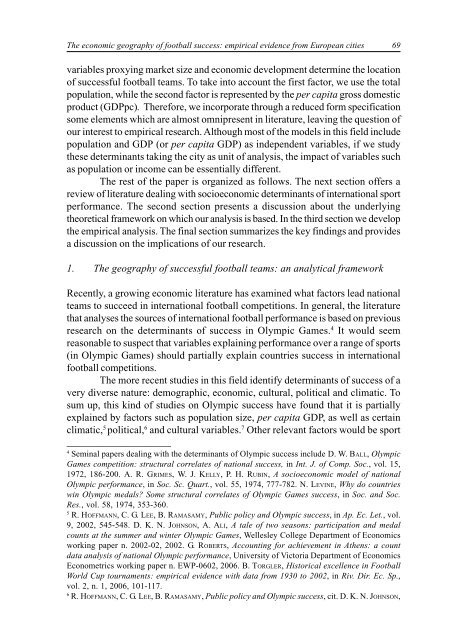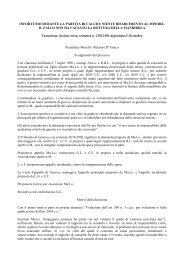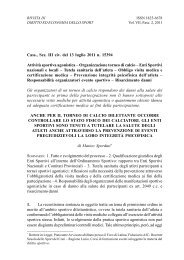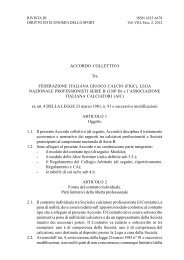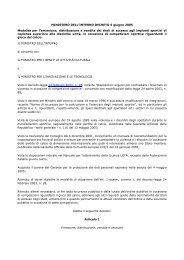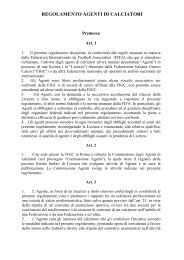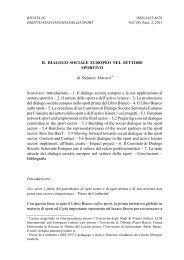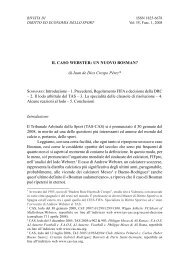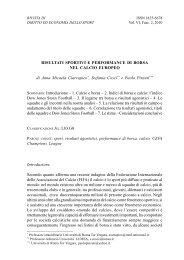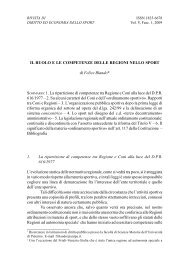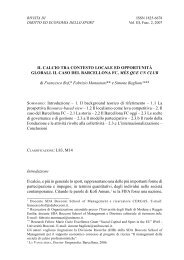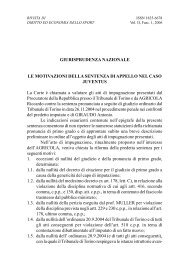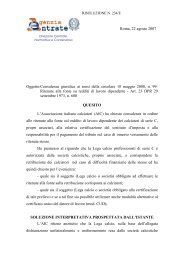68 Pablo Castellanos García, Jesús A. Dopico Castro and José M. Sánchez SantosUsually, there is a very strong link between a football team and <strong>it</strong>s hostc<strong>it</strong>y. However, professional football teams in Europe are not formally localmonopolies w<strong>it</strong>h a permanent major league status, because poor performance onthe field brings on relegation while good performance allows teams to compete ininternational championships. Taking into account these considerations, a c<strong>it</strong>y canhost none, one or several successful football teams. Obviously, compet<strong>it</strong>ivenessand international football success <strong>di</strong>ffer mark<strong>ed</strong>ly across in<strong>di</strong>vidual European c<strong>it</strong>ies.From this perspective, an interesting research topic is the analysis of the spatial<strong>di</strong>stribution of successful football teams (c<strong>it</strong>ies) throughout Europe.There is a wide l<strong>it</strong>erature dealing w<strong>it</strong>h the issue of whether professionalsports help local economies to develop, but in our case we address the con<strong>di</strong>tionsthat determine locations in which there are opportun<strong>it</strong>ies to strengthen the successof a team. 1 The l<strong>it</strong>erature that specifically deals w<strong>it</strong>h the determinants of successin international football is bas<strong>ed</strong> on models of national teams’ success. Most ofthese stu<strong>di</strong>es consider countries as relevant un<strong>it</strong>s of analysis and in general theyare primarily interest<strong>ed</strong> in testing the influence of social, demographic, economic,cultural and geographic factors on national teams’ performance.In contrast to previous research, this paper analyses the determinants ofsuccess taking c<strong>it</strong>ies instead of countries as un<strong>it</strong>s of analysis. 2 Consequently, theidea is slightly <strong>di</strong>fferent and our main interest is to verify in what extent economicand demographic factors have an impact on c<strong>it</strong>ies club teams success. We areconcern<strong>ed</strong> about verifying if a commun<strong>it</strong>y abil<strong>it</strong>y to support a successful footballteam is a function of the size and wealth of <strong>it</strong>s population. In this way, we will beable to study not only the spatial <strong>di</strong>stribution of football success across countriesbut also the outcomes of in<strong>di</strong>vidual c<strong>it</strong>ies. In other words, we are interest<strong>ed</strong> inknowing to what extent successful professional teams can get sufficient support ifthey are locat<strong>ed</strong> in c<strong>it</strong>ies w<strong>it</strong>h big potential markets, that is, in prof<strong>it</strong>able places.This kind of stu<strong>di</strong>es can be relevant since they attempt to sh<strong>ed</strong> some light on therole of some variables (market size proxies) that may create a revenue-generatingadvantage. In this respect, taking into account that geographic ties generate fanloyalty, bigger c<strong>it</strong>ies ought to yield higher revenue to owners than smaller ones.This is not a trivial aspect because <strong>it</strong> will probably affect the choices of investorswhen deci<strong>di</strong>ng on buying a club. 3Our approach is mark<strong>ed</strong>ly empirical and the analysis was design<strong>ed</strong> touncover the connection between c<strong>it</strong>ies economic features and their football teams’success. In particular, we focus our analysis on verifying the extent in which____________________1Although most of European clubs do not have the real abil<strong>it</strong>y to move, <strong>it</strong> can be assum<strong>ed</strong> thatsuccess is mobile.2To our knowl<strong>ed</strong>ge, this is the first attempt to consider the main c<strong>it</strong>ies of Europe as the relevantun<strong>it</strong>s of analysis.3For example, an important Italian Hollywood movie-producer bought the Naples Team. At thesame time, few years ago a Br<strong>it</strong>ish financial company bought a stake in a small northern team(Vicenza). The evidence shows that the latter has been unsuccessful whilst the first <strong>it</strong> is suppos<strong>ed</strong>to stay in the top-level teams in the next years.
The economic geography of football success: empirical evidence from European c<strong>it</strong>ies 69variables proxying market size and economic development determine the locationof successful football teams. To take into account the first factor, we use the totalpopulation, while the second factor is represent<strong>ed</strong> by the per cap<strong>it</strong>a gross domesticproduct (GDPpc). Therefore, we incorporate through a r<strong>ed</strong>uc<strong>ed</strong> form specificationsome elements which are almost omnipresent in l<strong>it</strong>erature, leaving the question ofour interest to empirical research. Although most of the models in this field includepopulation and GDP (or per cap<strong>it</strong>a GDP) as independent variables, if we studythese determinants taking the c<strong>it</strong>y as un<strong>it</strong> of analysis, the impact of variables suchas population or income can be essentially <strong>di</strong>fferent.The rest of the paper is organiz<strong>ed</strong> as follows. The next section offers areview of l<strong>it</strong>erature dealing w<strong>it</strong>h socioeconomic determinants of international sportperformance. The second section presents a <strong>di</strong>scussion about the underlyingtheoretical framework on which our analysis is bas<strong>ed</strong>. In the third section we developthe empirical analysis. The final section summarizes the key fin<strong>di</strong>ngs and providesa <strong>di</strong>scussion on the implications of our research.1. The geography of successful football teams: an analytical frameworkRecently, a growing economic l<strong>it</strong>erature has examin<strong>ed</strong> what factors lead nationalteams to succe<strong>ed</strong> in international football compet<strong>it</strong>ions. In general, the l<strong>it</strong>eraturethat analyses the sources of international football performance is bas<strong>ed</strong> on previousresearch on the determinants of success in Olympic Games. 4 It would seemreasonable to suspect that variables explaining performance over a range of sports(in Olympic Games) should partially explain countries success in internationalfootball compet<strong>it</strong>ions.The more recent stu<strong>di</strong>es in this field identify determinants of success of avery <strong>di</strong>verse nature: demographic, economic, cultural, pol<strong>it</strong>ical and climatic. Tosum up, this kind of stu<strong>di</strong>es on Olympic success have found that <strong>it</strong> is partiallyexplain<strong>ed</strong> by factors such as population size, per cap<strong>it</strong>a GDP, as well as certainclimatic, 5 pol<strong>it</strong>ical, 6 and cultural variables. 7 Other relevant factors would be sport____________________4Seminal papers dealing w<strong>it</strong>h the determinants of Olympic success include D. W. BALL, OlympicGames compet<strong>it</strong>ion: structural correlates of national success, in Int. J. of Comp. Soc., vol. 15,1972, 186-200. A. R. GRIMES, W. J. KELLY, P. H. RUBIN, A socioeconomic model of nationalOlympic performance, in Soc. Sc. Quart., vol. 55, 1974, 777-782. N. LEVINE, Why do countrieswin Olympic m<strong>ed</strong>als? Some structural correlates of Olympic Games success, in Soc. and Soc.Res., vol. 58, 1974, 353-360.5R. HOFFMANN, C. G. LEE, B. RAMASAMY, Public policy and Olympic success, in Ap. Ec. Let., vol.9, 2002, 545-548. D. K. N. JOHNSON, A. ALI, A tale of two seasons: participation and m<strong>ed</strong>alcounts at the summer and winter Olympic Games, Wellesley College Department of Economicsworking paper n. 2002-02, 2002. G. ROBERTS, Accounting for achievement in Athens: a countdata analysis of national Olympic performance, Univers<strong>it</strong>y of Victoria Department of EconomicsEconometrics working paper n. EWP-0602, 2006. B. TORGLER, Historical excellence in FootballWorld Cup tournaments: empirical evidence w<strong>it</strong>h data from 1930 to 2002, in Riv. Dir. Ec. Sp.,vol. 2, n. 1, 2006, 101-117.6R. HOFFMANN, C. G. LEE, B. RAMASAMY, Public policy and Olympic success, c<strong>it</strong>. D. K. N. JOHNSON,
- Page 5 and 6:
Rivista diDiritto ed Economia dello
- Page 7:
RedazioneDirettore:Direttore respon
- Page 10 and 11:
I LIMITI ALL’AUTONOMIA DELL’ORD
- Page 13 and 14:
RIVISTA DI ISSN 1825-6678DIRITTO ED
- Page 15 and 16:
Riflessioni in tema di diritto disc
- Page 17 and 18: Riflessioni in tema di diritto disc
- Page 19: Riflessioni in tema di diritto disc
- Page 22 and 23: 22 Valerio Fortipersonale, il credi
- Page 24 and 25: 24 Valerio Fortiper meglio decifrar
- Page 27 and 28: RIVISTA DI ISSN 1825-6678DIRITTO ED
- Page 29 and 30: Il calcio tra contesto locale ed op
- Page 31 and 32: Il calcio tra contesto locale ed op
- Page 33 and 34: Il calcio tra contesto locale ed op
- Page 35 and 36: Il calcio tra contesto locale ed op
- Page 37 and 38: Il calcio tra contesto locale ed op
- Page 39 and 40: Il calcio tra contesto locale ed op
- Page 41 and 42: Il calcio tra contesto locale ed op
- Page 43 and 44: Il calcio tra contesto locale ed op
- Page 45 and 46: RIVISTA DI ISSN 1825-6678DIRITTO ED
- Page 47 and 48: I limiti all’autonomia dell’ord
- Page 49 and 50: I limiti all’autonomia dell’ord
- Page 51 and 52: I limiti all’autonomia dell’ord
- Page 53 and 54: I limiti all’autonomia dell’ord
- Page 55 and 56: I limiti all’autonomia dell’ord
- Page 57 and 58: I limiti all’autonomia dell’ord
- Page 59 and 60: I limiti all’autonomia dell’ord
- Page 61 and 62: I limiti all’autonomia dell’ord
- Page 63 and 64: I limiti all’autonomia dell’ord
- Page 65: I limiti all’autonomia dell’ord
- Page 70 and 71: 70 Pablo Castellanos García, Jesú
- Page 72 and 73: 72 Pablo Castellanos García, Jesú
- Page 74 and 75: 74 Pablo Castellanos García, Jesú
- Page 76 and 77: 76 Pablo Castellanos García, Jesú
- Page 78 and 79: 78 Pablo Castellanos García, Jesú
- Page 80 and 81: 80 Pablo Castellanos García, Jesú
- Page 82 and 83: 82 Pablo Castellanos García, Jesú
- Page 84 and 85: 84 Pablo Castellanos García, Jesú
- Page 86 and 87: 86 Pablo Castellanos García, Jesú
- Page 88 and 89: 88 Pablo Castellanos García, Jesú
- Page 91 and 92: RIVISTA DI ISSN 1825-6678DIRITTO ED
- Page 93 and 94: TAR Lazio, Sezione Terza Ter, Sente
- Page 95 and 96: TAR Lazio, Sezione Terza Ter, Sente
- Page 97 and 98: TAR Lazio, Sezione Terza Ter, Sente
- Page 99 and 100: TAR Lazio, Sezione Terza Ter, Sente
- Page 101 and 102: TAR Lazio, Sezione Terza Ter, Sente
- Page 103: TAR Lazio, Sezione Terza Ter, Sente
- Page 106 and 107: 106 Giurisprudenza NazionaleCalcio
- Page 108 and 109: 108 Giurisprudenza Nazionale2) Viol
- Page 110 and 111: 110 Giurisprudenza Nazionale(arti.
- Page 112 and 113: 112 Giurisprudenza Nazionalenell’
- Page 114 and 115: 114 Giurisprudenza NazionaleCiò im
- Page 116 and 117: 116 Giurisprudenza Nazionalenominat
- Page 118 and 119:
118 Giurisprudenza Nazionaledi gius
- Page 120 and 121:
120 Giurisprudenza Nazionalel’ido
- Page 123 and 124:
RIVISTA DI ISSN 1825-6678DIRITTO ED
- Page 125 and 126:
TAR Sicilia, Sez. Catania, Decreto
- Page 127:
TAR Sicilia, Sez. Catania, Decreto
- Page 130 and 131:
130 Giurisprudenza NazionaleLEGA NA
- Page 132 and 133:
132 Giurisprudenza NazionaleConside
- Page 134 and 135:
134 Giurisprudenza Nazionalegiudice
- Page 136 and 137:
136 Giurisprudenza Nazionale- la Co
- Page 138 and 139:
138 Giurisprudenza Nazionale3) Nell
- Page 140 and 141:
140 Giurisprudenza NazionaleLa supr
- Page 142 and 143:
142 Giurisprudenza Nazionale“1. E
- Page 144 and 145:
144 Giurisprudenza NazionaleQuindi,
- Page 146 and 147:
146 Giurisprudenza Nazionaledella
- Page 148 and 149:
148 Giurisprudenza Nazionalepregiud
- Page 150 and 151:
150 Giurisprudenza Nazionaleva comu
- Page 152 and 153:
152 Giurisprudenza Nazionaleillegit
- Page 154 and 155:
154 Giurisprudenza Nazionale12) Per
- Page 156 and 157:
156 Giurisprudenza Nazionalepiena e
- Page 159:
NORMATIVA NAZIONALE________________
- Page 162 and 163:
162 Normativa Nazionaleprocedure e
- Page 164 and 165:
164 Normativa Nazionaleinternaziona
- Page 166 and 167:
166 Normativa Nazionaleapprovato il
- Page 169 and 170:
RIVISTA DI ISSN 1825-6678DIRITTO ED
- Page 171 and 172:
Codice Media e Sport 171Articolo 1
- Page 173:
Codice Media e Sport 173Articolo 4
- Page 177 and 178:
RIVISTA DI ISSN 1825-6678DIRITTO ED
- Page 179 and 180:
Libro Bianco sullo Sport 179allegat
- Page 181 and 182:
Libro Bianco sullo Sport 181seriame
- Page 183 and 184:
Libro Bianco sullo Sport 1839) Le r
- Page 185 and 186:
Libro Bianco sullo Sport 185con dis
- Page 187 and 188:
Libro Bianco sullo Sport 187di istr
- Page 189 and 190:
Libro Bianco sullo Sport 189per il
- Page 191 and 192:
Libro Bianco sullo Sport 191Per qua
- Page 193 and 194:
Libro Bianco sullo Sport 193“rego
- Page 195 and 196:
Libro Bianco sullo Sport 195Il tras
- Page 197 and 198:
Libro Bianco sullo Sport 197dello s
- Page 199 and 200:
Libro Bianco sullo Sport 19949) La


